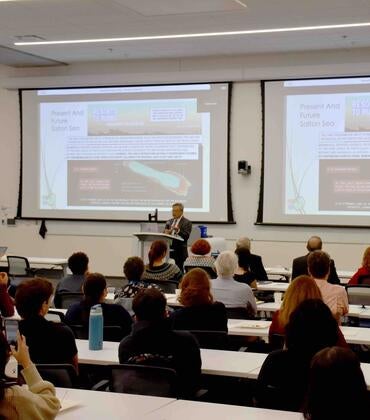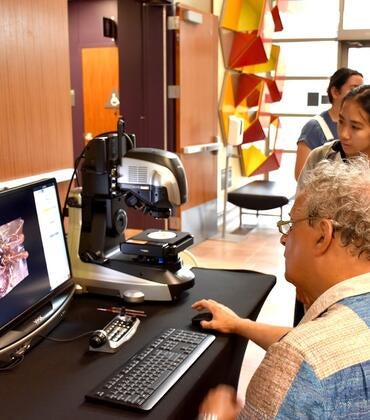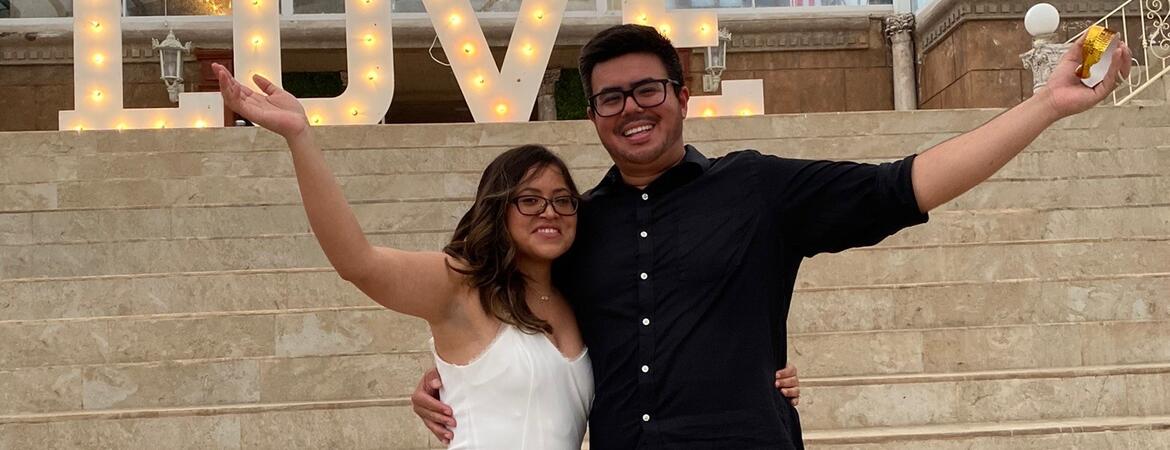
During one of the first meetings after Stephanie Guardado joined the UC Riverside School of Medicine’s Biomedical Sciences Ph.D. program from Cal Poly Pomona in 2016, one of her faculty members casually mentioned that there was a chance that the students might be sitting in the room with their future spouse. Stephanie remembers quietly scoffing at the idea.
To be fair, she was technically correct as it was a full year before her now-husband Edward Vizcarra joined the program in 2017.
The couple, who got married in 2021 in Southern California and then renewed their vows in El Salvador in July 2022, both completed their UCR journeys this past summer. Stephanie defended her thesis, “Lipocalin-2 Regulates IL-10 Levels in a Murine Model of Repetitive Inflammation Induced by Hog Dust Extract Inhalation” on July 25 and Edward defended his, "Glutamate's influence on mGluR+ CD8 T cells in Response to Chronic Toxoplasma Infection'" two months later on September 7. While wrapping up their research, they were also packing up their home and preparing for a move to San Jose to start work as postdoctoral scholars at Stanford University.
The couple laughed as they reminisced about their first meeting during the first BioMed 254 seminar of the year, known as Pizza Friday. Though she considers herself shy and a bit socially awkward, Stephanie made a point to walk over and introduce herself to her new colleagues. A few weeks later their paths crossed again as she served as a teaching assistant for one of Edward’s classes. He recalls being “impressed with the way she presented the science.”
As time went on, Edward began to strategize the best way to get to know Stephanie better, not wanting to come on too strong and drive her away. He worked with a mutual friend and biomedical sciences student, Jessica Noll ‘21, and set up a hike with the three of them and his dog, a German shepherd named Cassie.
“Jessica and I would go hiking every couple of weeks, and I love dogs, so it was cool,” Stephanie said. “We got to interact a little more, but honestly I just hung out with the dog the entire time.”
While Edward didn’t get to talk much with Stephanie that day, Cassie seemed to approve of her, so he invited her on another hike with him and Cassie. That led to a third hike with just the two of them, with the dog’s absence allowing them to focus more on each other.
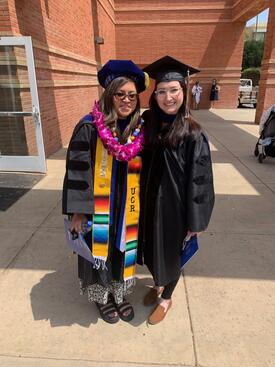
“When I actually started talking to him, I thought he was good looking and I really liked his personality,” Stephanie said. “He’s very well loved in the program, people gravitated towards him. He’s very kind and you can tell that he just cares and pays attention to what the person is talking about. I was definitely happy when we started hanging out.”
Their first official date was Friday, April 13, 2018. Edward wasn’t phased by any superstition, greeting her with a flower before taking her for a meal at Taqueria 2 Potrillos, followed by miniature golf, and capped off with a short hike to watch the sunset and the lights of the city twinkle under the stars. As he recounted the story on their wedding website, “by the end of the night, Edward had dispelled the superstition of Friday the 13th.”
They initially didn’t announce their relationship, and while some friends knew, there were other couples in the program that were more public, allowing Stephanie and Edward to fly more under the radar. But they were found out at the end-of-the-year Biomedical Sciences Awards dinner.
“We were quiet about it. Mark Wiley and Maham Rais were the ‘biomed couple’ that everyone gravitated to,” Edward said. “We had taken some pictures together in the photo booth and I had them in my pocket. Some people saw them in my pocket, took them out, and said ‘What is this all about?’ So I just said, ’Oh yeah, we’re dating now.’”
Meanwhile, Edward and Stephanie both continued to build their skills in the lab.
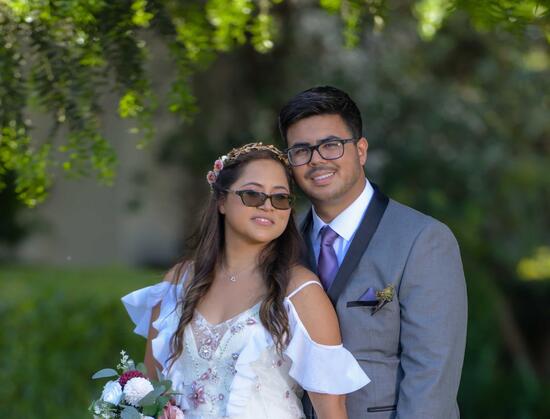
“It’s been very rewarding to witness his development into a truly exceptional scientist, critical thinker, writer and mentor,” said Nair, who was chair of his qualifying exam and co-sponsor of his fellowship. “His motivation and passion for science is evident. Whenever I bump into him, he always has a positive attitude and an interest in discussion – scientific and career development-wise – which generally leads to a one-hour conversation in the hallway.”
“Edward is very conscious of the weight of a first-generation Latinx student – he himself is inspired by his grandparents’ move to the U.S. and sees his ability to achieve this academic success directly related to them and their sacrifices,” Wilson said.
Tara Nordgren, now an assistant professor of environmental and radiological health sciences at Colorado State, said that the best word to describe Stephanie is “resilience.”
“She has overcome so many setbacks and obstacles to be where she is right now. She is incredibly steadfast, understanding, and determined to keep moving forward,” Nordgren said. “Her ability to identify growth opportunities even in the most difficult of circumstances will take her far in her career.”
“I would like to say that I’m proud of her and how far she has gotten – and I truly am very proud – but the statement almost takes away from how much she has truly done on her own, advocating for herself, seeing and seizing opportunities available to her, and that tenacity is something I cannot take credit for,” Nordgren added.
Plan A, Plan B, and a Pandemic
With the relationship now “official,” they began hosting dinners for colleagues and friends and continued to go on hikes. In 2019 they had scheduled a trip to El Salvador with Stephanie’s parents, Delmy and Julio, but work obligations made it so Stephanie couldn’t go. When she told Edward they wouldn’t be able to go, he replied “what do you mean ‘we?’” and Edward, Delmy and Julio went as planned.
Edward had fallen in love with El Salvador when he visited with a church group in 2010. “My eyes were opened to a lot of different things. I realized the opportunities that I had in the United States. People talk about how it can be dangerous, but I have visited three separate times and always had a good experience and never felt threatened,” he said.
Delmy and Julio had emigrated from El Salvador as teenagers in the 1980s during the country’s civil war, seeking asylum in the United States.
“They didn’t know each other in El Salvador, but they ended up meeting in the United States. They found out later that their families knew each other. My dad grew up in the countryside and my mom grew up in the city, but her family had lived in the countryside.” When they got engaged and introduced the families, they realized that the families had known each other years before.
The visit was Edward’s chance to meet Stephanie’s extended family, and if there was a test, he passed with flying colors.
“My family loves him. Everybody who meets him thinks that he is so great. Sometimes I think that my family might like him more than they do me,” Stephanie said with a laugh. “That is just another example of his amazing personality and how people gravitate towards him. People just want to talk to him.”
During the trip, Edward visited the Linda Vista Gardens restaurant perched on the side of the dormant San Salvador Volcano. It offered amazing views of the countryside and the nearby city of San Salvador. “I was so excited about this place! It was a volcano and it was just so beautiful,” he said. “You can see lakes and other volcanoes out in the distance, and at night you can see lightning storms.”
He began planning that he would ask Stephanie to marry him at the restaurant during their upcoming visit in 2020, but then pivoted when she figured out his plans. Instead, he put a deposit at the restaurant for August 8, 2020 and enlisted the help of family to set up an elaborate surprise proposal at a Temecula winery on Leap Day, February 29, 2020. The surprise worked and Stephanie said yes. But the plans for a summer wedding were scuttled by the appearance of COVID-19.
“Everything started shutting down and there was a lot of confusion, but it became clear that we were not going to be able to get married in 2020,” Edward said.
The couple continued their work in their respective labs, Stephanie with Professors Marcus Kaul and Tara Nordgren and Edward with Professors Emma Wilson and Meera Nair, and turned their sights towards a smaller wedding the next year as well as other endeavors. Edward teamed with fellow UCR grad students Paula Da Silva Frost and Joe Valdez to create an eight-episode podcast called “Welcome to Grad School” that talked about graduate students’ backgrounds and some of their experiences during grad school.
As COVID-19 grudgingly relented and the world began to reopen, Stephanie and Edward were finally married on June 26, 2021 in front of about 90 guests, many of them students and colleagues from the biomed program, with a reception in the backyard of Edward’s parents’ home in Corona. While there was an online version for those who couldn’t make the trip, they never lost sight of the plan to return to El Salvador. On July 30, 2022, just five days after Stephanie defended her Ph.D., they made the trip to the side of the volcano and once again made their vows to one another.
“I call it a second wedding, she calls it a vow renewal,” Edward said.
“The first wedding was to accommodate everyone from the U.S., because people didn’t want to travel during COVID times. The second one was more for family from El Salvador, though we still had some people from the U.S.,” Stephanie explained.”I still have a lot of family there, a lot of aunts, uncles, and cousins. I appreciate my roots, and everything my parents have worked hard for. ”
Edward shared her sentiment, wanting to have an inclusive wedding experience. “After the 2019 trip, meeting her family and how they treated me, I wanted to make sure they were part of the celebration,” he said.
After the wedding, Edward’s energies turned towards his thesis defense, which was held both in person and online. Stephanie served as a moderator for the Zoom room, hoping to avoid some of the challenges that she faced during her own defense.
“My defense was entirely virtual, because it was just easier for everyone to participate,” she said, explaining that one of her advisors was in Colorado. “I told my parents to make sure they practiced on Zoom and knew how to use the mute button and turn the video on and off. My mom said ‘Don’t worry, I’ve got this.’ Then, on the day, you could hear everything that they were saying. We had to ask them multiple times to mute themselves.”
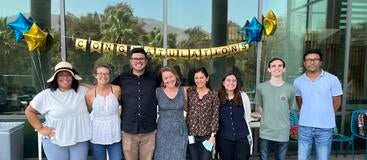
“When it got to the acknowledgement slide where I thanked my parents, you could hear them say, ‘Oh, no, here is where the tears come out,’ and I had to ask them in front of everyone to please stay silent. So I made sure that didn’t happen on his defense,” she said with a smile.
The only challenging moment during Edward’s defense was when he came to the acknowledgement slide.
“There were a lot of tears on my end and in the room, starting when I acknowledged the sacrifices my grandparents made for our family when they moved here from Mexico,” he said. “After that, the exam was more of a conversation among scientists with my committee members, Dr. Wilson, Dr. Nair, and Dr. (Marcus) Kaul.
Taking the Next Steps
Stephanie started work at Stanford on September 14 and Edward starts on October 3. He will be characterizing the immune response to COVID and the Epstein-Barr virus and she will be conducting research on high blood pressure in the lungs and how it leads to heart failure.
“I’m excited that Stephanie is continuing in the lung field in her new postdoc position—it will make it easier for me to stay involved and aware of how her career progresses from here,” Nordgren said.
While Stephanie and Edward are leaving UCR behind, they are taking UCR’s culture with them. They both spoke highly of their colleagues in the program, many of whom went above and beyond for one another to ensure that everyone was successful.
“We definitely appreciate the biomed students. As students, we are a close-knit community, and even the faculty, a lot of them really do care about the students,” Stephanie said.
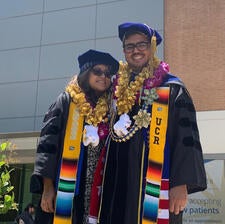
“For years, past students have created a culture of lifting up and supporting the next class,” Edward agreed. “We worked hard to pay that forward and to be that resource for classes to come.”
“Edward’s ability to ask relevant and thought-provoking questions to other trainees during their presentations has really helped them develop into better scientists,” Nair said. “That, and his ability to receive feedback and use it to critically assess and improve his work, will serve him well as he embarks in his new career and begins to train the next generation of scientists.”
“I can say he has done exactly what he hoped to achieve – he is an inspiration to his community and made his family extremely proud,” Wilson said. “I have no doubt he and Stephanie will continue to do so and I can’t wait to see what’s next for them!”
